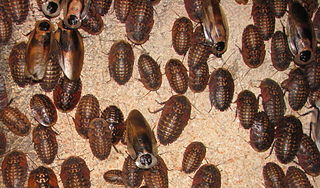
Giant cockroaches, or blaberids, are the second-largest cockroach family by number of species. Mostly distributed in warmer climates worldwide, this family is based on the American genus Blaberus, but much of the diversity is also found in Africa and Asia.

Conocephalus is a genus of bush crickets, known as coneheads. It was described by Carl Peter Thunberg in 1815.

The Melanoplinae are a subfamily of grasshoppers in the family Acrididae. They are distributed across the Holarctic and Neotropical realms. They are one of the two largest subfamilies in the Acrididae. As of 2001 the Melanoplinae contained over 800 species in over 100 genera, with more species being described continuously.
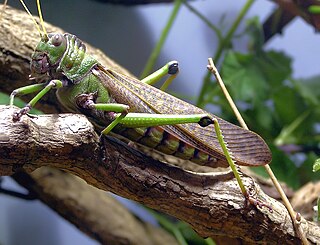
The Romaleidae or lubber grasshoppers are a family of grasshoppers, based on the type genus Romalea. The species in this family can be found in the Americas.
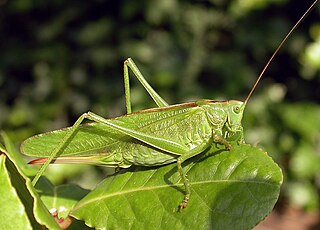
The Tettigoniinae are a subfamily of bush crickets or katydids, which contains hundreds of species in about twelve tribes.

Tettigidea is a genus of groundhoppers or pygmy grasshoppers in the tribe Batrachideini from the Americas. There are at least 40 described species in Tettigidea.

Trimerotropis is a genus of band-winged grasshoppers in the family Acrididae. There are at least 50 described species in Trimerotropis.

Schistocerca is a genus of grasshoppers, commonly called bird grasshoppers, many of which swarm as locusts. The best known species is probably the desert locust and trans-Atlantic flight may explain the biogeography of some locust species.
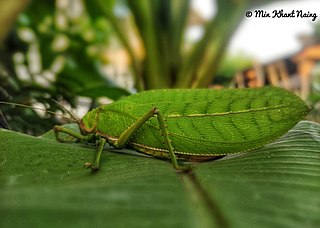
The subfamily Pseudophyllinae contains numerous species in the family Tettigoniidae, the katydids or bush crickets. Sometimes called "true katydids", together with the crickets of suborder Ensifera, they form part of the insect order Orthoptera which also contains grasshoppers.

The Phaneropterinae, the sickle-bearing bush crickets or leaf katydids, are a subfamily of insects within the family Tettigoniidae. Nearly 2,060 species in 85 genera throughout the world are known. They are also known as false katydids or round-headed katydids.
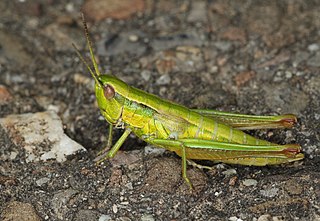
Gomphocerinae, sometimes called "slant-faced grasshoppers", are a subfamily of grasshoppers found on every continent but Antarctica and Australia.
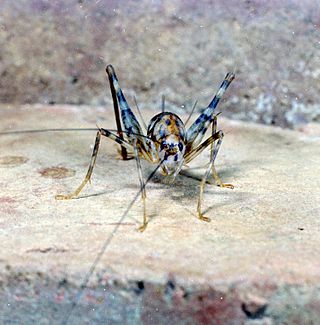
Ceuthophilus is a genus of insects in the cave cricket family Rhaphidophoridae. It contains most of the species that are known commonly as camel crickets.
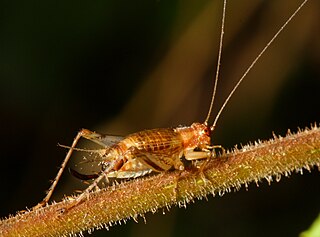
Anaxipha is a genus of brown sword-tail cricket from tropical areas in the Americas, Africa, Asia, Australia and western Pacific islands.

Conocephalinae, meaning "conical head", is an Orthopteran subfamily in the family Tettigoniidae.

Neoconocephalus is a genus of katydids or bush crickets in the tribe Copiphorini, from the Americas.

Romaleinae is a subfamily of lubber grasshoppers in the family Romaleidae, found in North and South America. More than 60 genera and 260 described species are placed in the Romaleinae.

Atlanticus is a genus of "eastern shieldback" bush crickets or katydids in the tribe Drymadusini. It has a discontinuous recorded distribution in North America and temperate eastern Asia.

Orphulella is a genus of slant-faced grasshoppers in the family Acrididae. There are more than 20 described species in Orphulella, all found in the Americas.

Leptysma is a genus of spur-throat toothpick grasshoppers in the family Acrididae. There are about five described species in Leptysma.



















